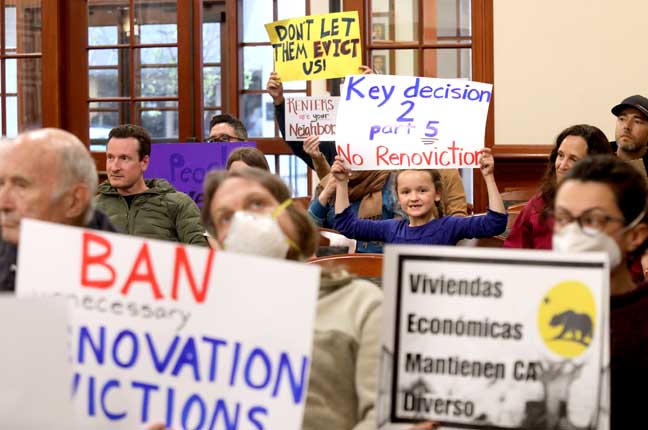Council approves restrictions on no-fault evictions

Proponents of a just cause eviction ordinance hold signs during Tuesday’s Claremont City Council meeting. The council voted 3-1 to support the ordinance. Courier photo/Steven Felschundneff
by Steven Felschundneff | steven@claremont-courier.com
The Claremont City Council took a bold stand in defense of the city’s many renter households Tuesday by tightening state law that protects tenants from certain “no-fault” evictions.
By a 3-1 vote the council passed a local “Just Cause for Eviction” ordinance shielding tenants from certain no-fault substantial remodel evictions, which some landlords have used to remove longtime residents so that the unit can be rented for more money.
Mayor Ed Reece was absent from the meeting due to a family emergency, but recused himself when the issue came before the council two weeks because he owns rental property in Claremont.
Under the new ordinance a landlord in Claremont who wants to evict a tenant in good standing would have to show a proposed remodel is necessary to “bring the rental unit into compliance with applicable codes and laws affecting the health and safety of tenants or the building.”
Additionally, the rules would require landlords to secure building permits from the city and provide tenants with copies of the permits; provide proof that the remodel will take longer than 30 days and that the work cannot reasonably be accomplished with the tenant in the unit; and the cost of the remodel must be at least six times what the tenant is paying in monthly rent.
Tuesday’s deliberations on the just cause eviction ordinance were a continuation of the council’s April 25 meeting that stretched into the early morning hours. Due to the late hour, the council elected then to delay making several key decisions that would have a lasting effect on both tenants and landlords. The council did vote unanimously to allocate $1 million in American Rescue Plan Act money to fund a Temporary Housing Stabilization and Relocation Program to provide rent payment grants to tenants and money for owners to make needed improvements
In an unusual move, the council elected to bring back the “health and safety” provision it had decided not to support during its meeting two weeks ago. Council member Jed Leano suggested it consider adding that requirement back into the ordinance after receiving multiple written comments that indicated it might help keep people in their housing.
“AB 1482 purposefully left these decisions in local control, so cities could decide how to best protect their tenants, adding protections they see fit,” longtime tenant Lydia Hernandez said in a letter to the council. “This is not a gray area: restricting renovation evictions to those necessary for tenant health and safety is within the scope permissible for local control.”
Hernandez and many of her fellow renters at Monarch Terrace apartments brought signs to the meeting imploring the council to tighten the substantial renovation eviction rules. The residents of that building brought the substantial renovation eviction issue to the council’s attention last year after a new owner threatened mass evictions. In response to the prospect of dozens of people losing their homes, the council passed a temporary eviction moratorium to give it time to draft permanent rules.
During the previous meeting the council was swayed by a general concern over potential litigation if it adopted an ordinance that was too restrictive. At issue was the possibility that a group or individual could sue because the rules hampered the owner’s ability to make decisions about the property. There was also a concern that stricter rules could result in buildings falling into disrepair because the law creates too many hurdles for an owner who wants to make improvements.
The ordinance the council eventually passed was aimed directly at stopping the practice of purchasing an apartment building with the sole intention of renovating it and evicting the existing tenants. The council’s reassessment of the “health and safety” provision was influenced in part by the reassurance that Claremont would not be the first community to enact such a law, and the knowledge that if challenged the council could quickly rescind the rule.
Certain units will be exempt from the ordinance, including any rental specifically excluded by Assembly Bill 1482, the Tenant Protection Act of 2019. This includes single family homes, except those owned by a corporation; duplexes where the owner lives in one unit; accessory dwelling units; or any home with a government mandated low-income covenant.
Additionally, the council elected to exempt small time “mom and pop” landlords which it defined as anyone who owns nine or fewer units in Claremont. Council members Jed Leano and Jennifer Stark advocated for setting the bar lower, at four or fewer units.
The council needed to determine at what level one becomes a commercial landowner and the five and above figure was put forward as a housing industry standard. However, Mayor pro tem Sal Medina felt that move could harm the financial stability of many smaller housing providers, which statistically make up a large percentage of a city’s rental stock.
“Do we care more about an industry standard or our own mom and pops?” Medina asked.

Council member Corey Calaycay did not participate in the deliberations over the just cause eviction ordinance in part because he objected to the Courier’s coverage of the previous meeting. Courier photo/Steven Felschundneff
Council member Corey Calaycay opted out of participating in the deliberations all night in part because of what he feels was a mischaracterization of his position published in the April 28 edition of the Courier:
“In order to begin the conversation about the details in the just cause ordinance, the council first had to agree it was needed. This was complicated when Council member Corey Calaycay asked to hear the details before voting. The body was stymied briefly until Mayor pro tem Sal Medina broke the stalemate by signaling his support for the ordinance,” reads an excerpt from last week’s story.
“My silence is partially out of frustration,” Calaycay said on Tuesday. “I am also disappointed that a newspaper that values free speech indirectly quells mine by belittling [me] when I have a difference of opinion, suggesting that complicated the matter. So yes, I am a bit frustrated tonight. I apologize if my feelings are being misconstrued. But I don’t like to be asked to choose between people. And then the assumption is if you do for the tenants you don’t care for the landlords, if you do for the landlords you don’t do for the tenants. I voted for the one thing I feel morally right about, that I felt comfortable about, that takes care of everybody. That uses our government money, which to me if we are going to implement a program, use our money to fund it. Not asking private individuals to fund a government social program. That’s not right,” Calaycay said.
“I stand by what I said, I am sorry but I feel like I am losing no matter what here because, again, I feel my silence is being misinterpreted by some. And again, at the same time that is my opinion. I don’t ask my colleagues to have to agree with me. You made the point Jennifer, that this is difficult for everybody in their own way. Everybody is coming at this from our own perspective, but this is mine.
“At least up here we [council members] have had respect for each other. I did not respect the way the Courier treated me. I will put that on the record and may you publish that word for word as I said Steven, not just a synopsis of what you think I am thinking. I have no respect for you and the Courier after that.”
The council elected not to enact a local rent stabilization ordinance which would have placed a tighter cap on rent increases, opting to stay with the state law that limits landlords to annual increases of 5% plus inflation or 10%, whichever is lower.
Additionally, the decision was made to remove anti-harassment language from the ordinance because it was too vague and could lead to a disruption in valuable dialog between landlords and tenants. The council asked city staff to do further research including stakeholder outreach to refine the proposal at a later date.
The Just Cause for Eviction ordinance will have a second reading on May 23rd and, if it is adopted, will go into effect 30 days later.








0 Comments